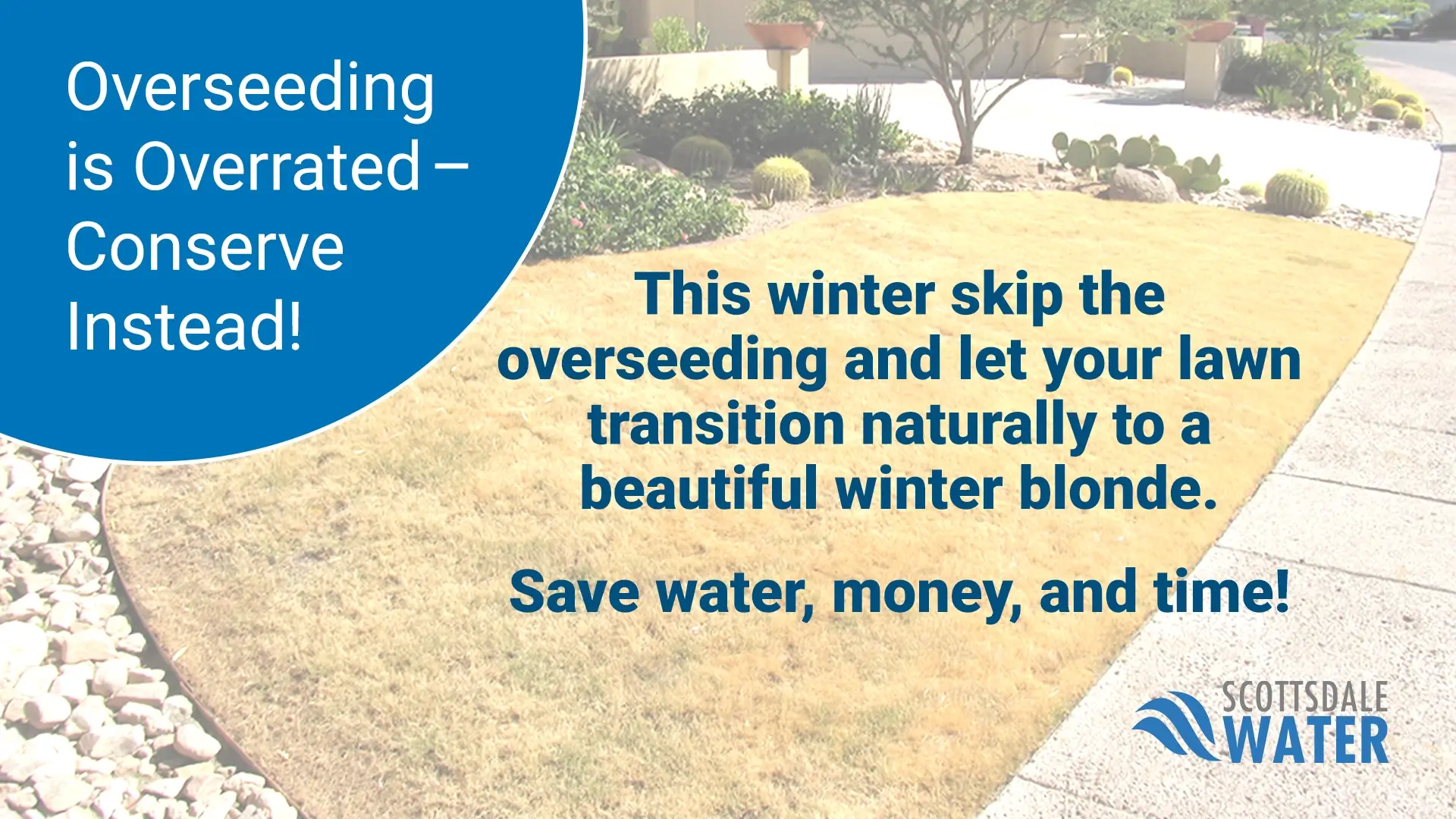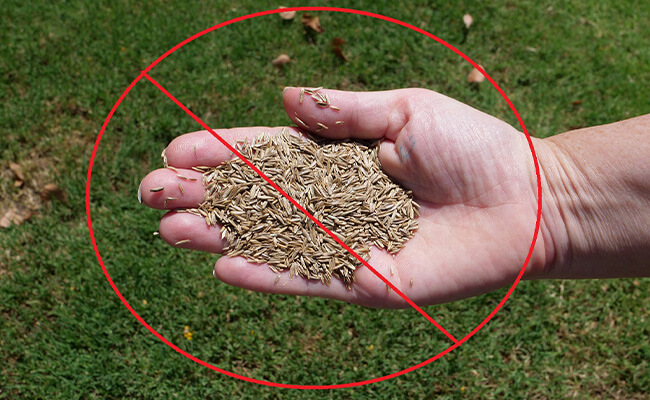
Overseeding is Overrated
In the desert, one of the few seasonal changes we experience is the dormancy of plants, where we move from the bright colors of spring into the pumpkin latte colors of fall and winter. Why not maximize your holiday spirit and let the grass life cycle evolve? In the late fall, summer grass (typically Bermuda) goes from hues of green to golden yellow to blond for wintertime. Once it warms up in early springtime, the grass returns to green.
Although some residents choose to overseed with winter grass (typically ryegrass) to install a temporary winter lawn, it's rarely necessary. A significant amount of time, effort, and money is required to establish and maintain winter lawns. There are many benefits to forgoing winter lawns while also giving your Bermuda grass the rest it needs for a more vibrant spring renewal.
Scottsdale asks its residents to voluntarily forgo overseeding in some or all areas of their landscape.
Reduce Your Water Footprint
It is estimated that 8,000 gallons of water are required each season for 1,000 square feet of winter grass. However, most people who overseed experience a much higher spike in water use which gets reflected on their utility bill. This water use may be higher than the hottest summer months, due to an overapplication of water for seed germination and winter growth. Please see water Rates & Fees to estimate potential dollar savings. Scottsdale has asked all residents and businesses to conserve and reduce water use by at least 5% as part of the Drought Management Plan. This is one easy way to be a part of that equation.
Reduce Your Workload
Forgoing overseeding may result in significant cost savings on labor, seed, fertilizer and water. Check with your landscaper to determine which costs are associated with overseeding.
Skipping overseeding also means you can enjoy the benefits of cleaner air, less noise pollution from mowers and blowers, reduced fertilizer runoff and less green-waste going to the landfill. Saying “no” to winter lawns demonstrates your commitment to the sustainability of our desert environment, and it is easier on the wallet. Not overseeding is the right thing to do!
Overseeding is Detrimental to Summer Grass

Bermuda grass can grow quickly and more efficiently recover from winter dormancy if it is not overseeded. Bermuda grass can remain green until mid-November, at which time it becomes dormant. You can expect Bermuda grass to start actively growing once the weather warms up sometime in mid-March.
Overseeding with ryegrass prevents Bermuda grass from completing its life cycle of storing energy prior to its winter dormancy. When temperatures begin to rise in the springtime, the Bermuda grass lacks energy and therefore has difficulty reestablishing itself.
When these two types of grass compete for resources, it may leave your summer lawn looking lackluster, especially after repeated winters of overseeding. Despite what is commonly cited, winter overseeding is NOT necessary for summer grass health, it is actually detrimental! A good example of not overseeding is Scottsdale's parks.
Spruce up your summer grass by evaluating it to make sure it is healthy and cared for (e.g., fertilized, aerated). If there are areas with no grass or it’s patchy due to deep shade, consider removing the remaining grass and installing a topdressing such as compost or decomposed granite. Summer grass does not grow in deep shade.
But what about my pets?
Grass became popular in the mid-19th century; however, it really took off around the 1950s. We have loved our pets a lot longer than that! If you provide grass, they usually use it, and if you let the Bermuda grass follow its life-cycle seasons the pets will continue to use it. We know some pets may not like change, so consider selecting a smaller area for winter grass or try a new routine, like taking them for walks or to the park. Pets will love the walks and you both will be doing your part to save water!
Selectively Overseeding
Overseeding does not have to be an all-or-nothing proposition. Winter overseeding can be limited to high-traffic recreational, high-visibility and/or pet areas while allowing low-use areas to become dormant, like your front yard.
Never overseed non-functional grass. Non-functional grass is grass that is ornamental and serves no public or recreational function. Non-functional grass areas are prime candidates for Scottsdale's grass removal rebate programs.
Homeowners’ association (HOA) members are encouraged to review Ordinance No. 4567 of Scottsdale’s Code of Ordinances. Updated in 2022, this ordinance prohibits HOAs from requiring its members to over-seed for a winter lawn.
How Much to Water?
The Landscape Watering by the Numbers guide will help you with water efficiency and if you overseed, review resources from the U of A Cooperative Extension on timing and appropriate overseeding procedures.
Scottsdale Water Resources
9312 N. 94th St. Scottsdale, AZ 85258Hours
| Monday | 7 a.m. - 4:30 p.m. |
| Tuesday | 7 a.m. - 4:30 p.m. |
| Wednesday | 7 a.m. - 4:30 p.m. |
| Thursday | 7 a.m. - 4:30 p.m. |
| Friday | 7 a.m. - 4:30 p.m. |
| Saturday | Closed |
| Sunday | Closed |